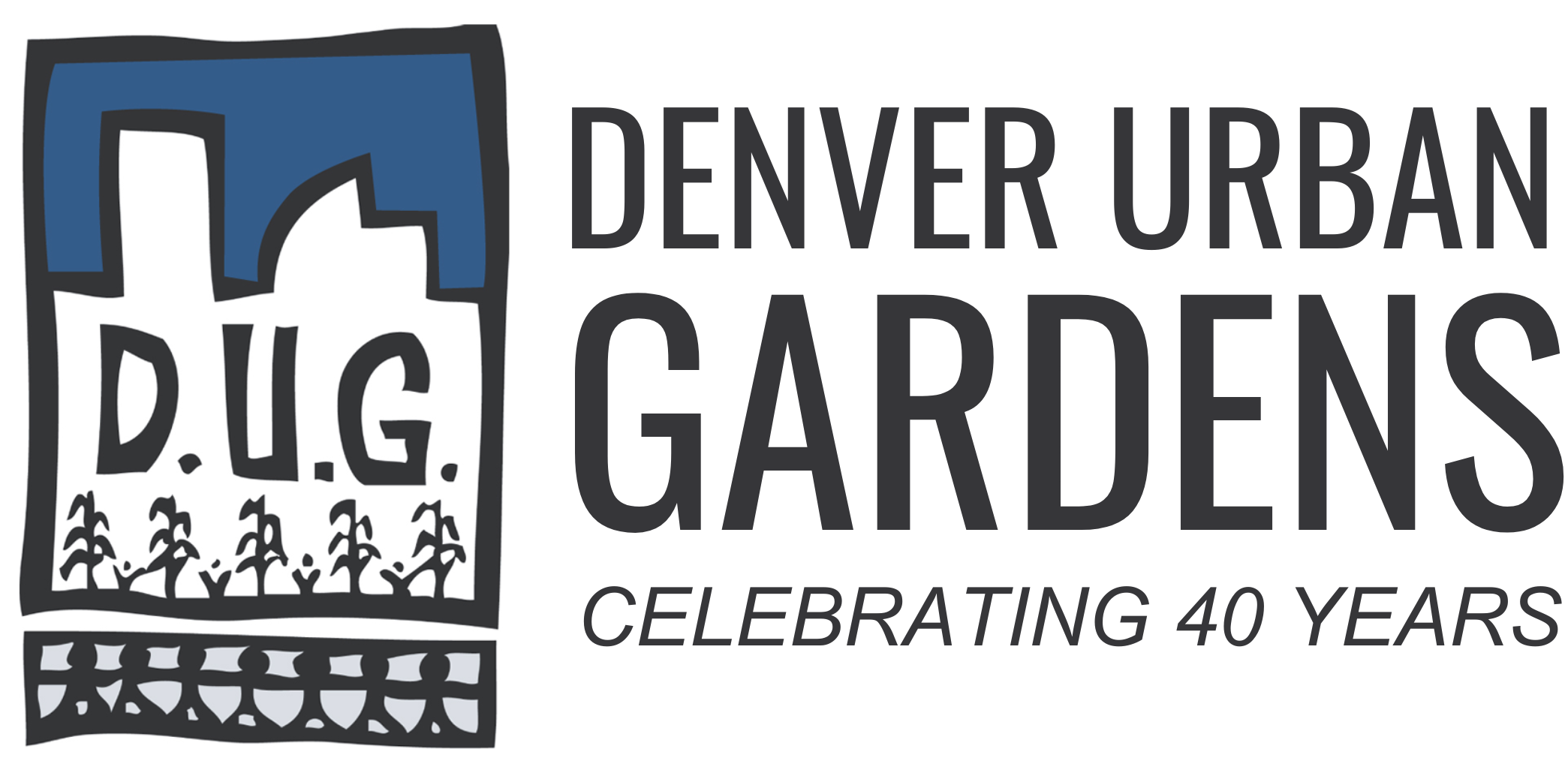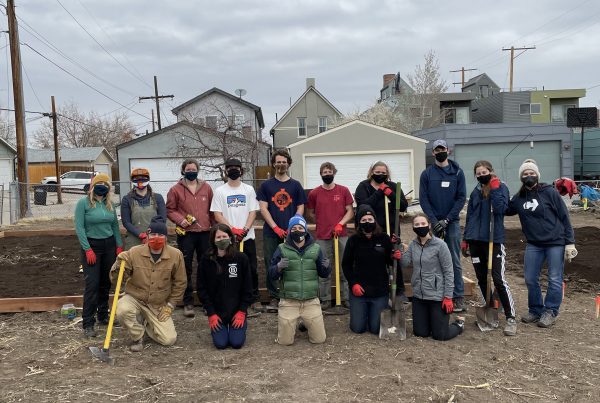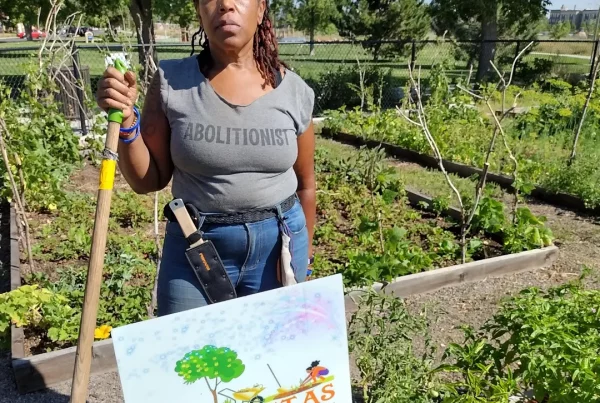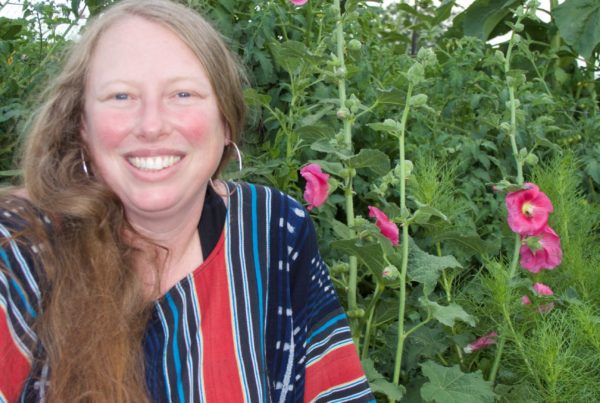#27: Meet Robbin, gardener, mentor, and community leader
“I got into gardening in 2000 when I was suffering from severe clinical depression. In my research, I found information around diet and nutrition but also found a piece around gardening, and I thought that was kind of different. So I got a beautiful little pot with a geranium on my patio in Los Angeles. That was my very first attempt to grow anything. And it’s been a long journey from there!
When I moved to Colorado, I shared my property with my grandmother. There was a little space with some ground in the back. I don’t even remember what I grew. But whatever I put back there grew, and I was like, “Oh wait, I might know how to do this!” That was what piqued my interest. It seemed I had an intuitive ability.
Images courtesy of Robbin Otey and the sow sistas FB page
DUG came into the picture as my hobby got out of hand. I found out about DUG’s two coaching programs: the Master Community Gardener Program and the Master Composter Program. My pedagogy is always to start with science. So that’s how I ended up doing both programs.
The work that I do now is garden ministry.
I grow our ministry through A Georgia Green Project. My role in A Georgia Green Project is to manage the garden and teach others – composting, companion planting, you name it. I’m teaching people about resisting food apartheid and how to invite community into the gardens.
My other group, the sow sistas, is a mentorship group of ladies. I’ve had some very micro-aggressive experiences in the community. I consider myself to be resilient, but in Colorado, any environment that I’m in is going to be – if it’s 10 people I’m probably going to be the only black woman (well people think I’m a black woman, and I identify as a black woman, but I’m actually Washitaw). Not that that doesn’t affect me, but there are other personalities and types of people that don’t feel welcome. So I’m like, “Okay, we need to figure out how we can be in this space.”
That’s kind of how it manifested in the DUG space. Colorado has a very bloody history around the land, so we always honor it. We appreciate the ability to lease the plots with DUG and I appreciate all of the educational opportunities DUG offers. That’s part of what the sow sisters is about — let’s garden together as a group, let’s harness this information.
Our focus is resisting food apartheid, exploring global food sovereignty, and educating ourselves and our community on these issues and our program is centered around black women and girls.
Anyone can garden with us, but that’s our focus. Our intent is to solve for isolation. In a community garden, it takes a team effort to make it work. We manage the plots together. We account for people’s physical limitations — we have some that can pull the wheelbarrows and some that can do the weeding, but everyone can contribute.
It is intergenerational — we also have the little sow sistas, the young girls who help out. We’re actually able to employ the sow sistas, which is part of our mission. So that people can know there’s work, there are jobs, and there are lots of careers in the Ag world, not just growing food.
We also have The Kaleidoscope Project (TKP). TKP was part of the DUG garden at Shorter AME Community Church, and the pastor reached out to me to ask if I wanted to do something in the garden. They’re social activist trainers, so the whole program at TKP is around claiming our power in the food system. TKP also has music programs with young people in the garden. TKP had done pop-ups in different areas that did not have easy access to fresh food. And so the pastor was like, ‘We can just do our own thing!’ People are able to barter or pay what they can. I’m excited to see the music that they’re going to do around what’s happening in their garden.
Our group is motivated by love. Love for ourselves, love for our families, love for community, and love for humanity. The more that we all vibrate high, whatever love looks like, the better the whole world is going to be.
My love language is resisting food apartheid and growing–people, places, and things. That’s what I do. I support the women that want to garden. One of our guiding principles is that the land and the food is sacred.
For me, love is a resistance tool. Everyone says ‘support’ global food sovereignty, but we have to understand that we cannot be afraid of the truth that there were very violent actions in this documented history and herstory of the land. People were killed to gain these resources. This information matters not so that people get angry, you move past that.
I appreciate the opportunity to share that gardening can be a love language. For people to open their minds and to be intentional about how they eat and even if they don’t grow, support those that do — that’s the food sovereignty piece, right? Go find a local market that’s better for your health and go eat some food that was grown four blocks from you, rather than something that was driven 12 hours in a truck.
The pandemic was a huge catalyst in everything that is manifesting in my life around gardening and what I see happening in the garden. Folks were gardening that had never gardened before that always wanted to — it was all over the internet. We couldn’t find stuff in the stores.
I usually grow edible pollinators. The new thing I’m growing right now is my moon bed. The intent is to attract those nighttime pollinators in the dusk. It’s beneficial because the flowers are white. Typically they’re also highly fragrant flowers. Part of the sow sistas is our aesthetic — we care that it looks pretty. I sowed biennial hollyhock last year and it’s blooming beautifully pink this season.
The very first lesson for a new gardener is to find your ‘Why.’ Your ‘why’ is going to matter when you don’t feel like getting out there to water.
There are many ‘why’s.’ Some of the sow sistas are in the group for the social piece. Some are there to get the education. Some are there to get the physicality. Some just want to be out there in the fresh air. And some want to have control over their food. To know that there should be a ‘why’ is going to support you.
If I were to encourage someone who had never gardened before, I would give them the basic five. The basic five is ‘Planning. Take time to ‘Plot.’ ‘Pay Attention’ to where you’re planting. Include ‘Pampering’ — that’s the fertilizing, the water plan, the pest control. The last piece is the ‘Pulling’ — that’s the harvesting and the preserving.
Take the time to be plant-specific. Do some companion planting. Start with the science. That’s what beginners don’t realize. They’re like, “Oh I thought we were just going to be taking pictures and wearing the uniform shirts.” Like no sister, grab a shovel (laughter).”






